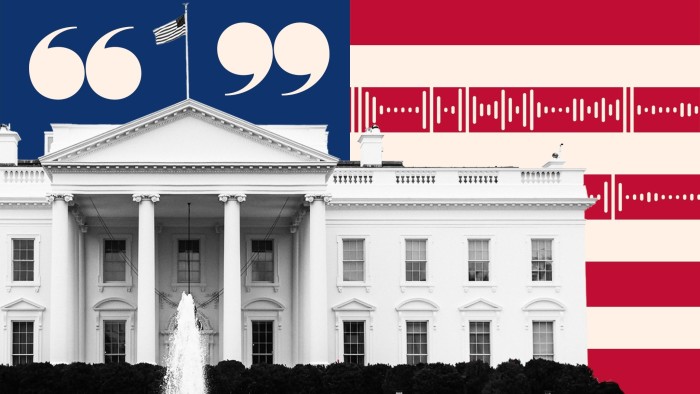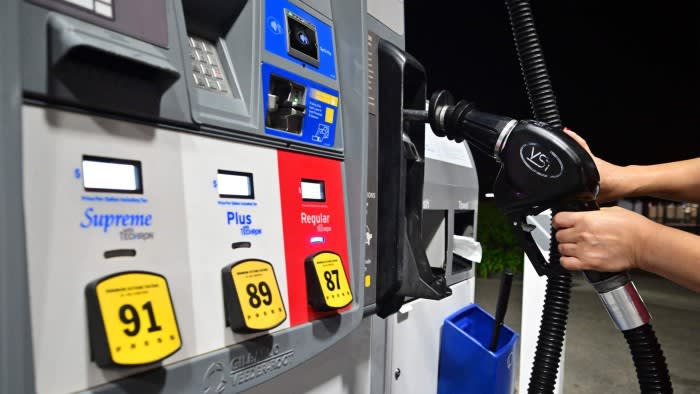A new rise in US inflation is undermining Joe Biden’s re-election message, threatening the president’s effort to defend his economic record in a crucial phase of the campaign against Donald Trump.
The 3.5 per cent annual increase in the March consumer price index followed a 3.2 per cent gain a month earlier, and has made it suddenly much harder for Biden to argue that inflation is continuing to move steadily downwards since hitting a multi-decade peak in the summer of 2022.
If followed by other hotter than expected inflation figures in the coming weeks, it could also lead the Federal Reserve to push back interest rate cuts that would bring relief from high borrowing costs for many American households this year.
Even though the US economy has created more than 15mn jobs under Biden’s watch, the jump in inflation during his tenure has cast a cloud over his handling of the economy and remains one of his biggest political weaknesses heading into the November vote.
White House officials on Wednesday said that they had always expected the process of bringing down inflation to be bumpy — and that they believe inflation will soon begin easing again.
During a press conference with Japanese Prime Minister Fumio Kishida earlier on Wednesday, Biden said he still expected the Fed — which has an official target for inflation of 2 per cent — to cut rates this year. “This may delay it a month or so,” he said.
In national polling, Biden has been able to gain back some ground over Trump in recent weeks after the former president held a small lead earlier this year: the race is now essentially tied based on the Realclearpolitics.com average of surveys of a head-to-head match-up.
But the political peril for the president is significant. The consumer price index is up 18.9 per cent since he took office in January 2021.
Any stalled progress on inflation could threaten to upend any general improvement for Biden — just seven months ahead of the election.
“People still feel like the United States has a significant inflation problem,” said Larry Summers, a professor at Harvard University and former US Treasury secretary, told the Financial Times. “Whether that’s because they remember the past, or because high interest rates have raised the cost of money, people are still feeling like inflation is not completely under control.”

Republicans pounced on the higher inflation data to blast Biden’s economic policies.
“Clearly there is a massive disconnect between the White House and their narrative that the economy is strong, and the exorbitant cost of living that Americans are experiencing,” Andy Barr, a Republican member of the House of Representatives from Kentucky, said in an interview.
“This administration’s inflation crisis remains sticky and persistent,” he added.
Biden’s top economic aides insist that their top priority is combating these resurgent price pressures, and have proposed or enacted policies specifically designed to bring down expenses for US households.
The president spoke about the efforts in last month’s State of the Union address and has since repeated the message at several events.
“We’re just going to keep our heads down and continue fighting to lower costs from prescription drugs to junk fees to housing and child care,” said Jared Bernstein, the chair of the Council of Economic Advisers at the White House.
“We’ll also keep working to make sure the American people know about this agenda, and how different it is from Congressional Republicans’ focus on cutting taxes for the rich and increasing prices where we’re trying to cut them,” he said.
Biden administration officials are also confident that inflation can still be tamed. Janet Yellen, Treasury secretary and former Fed chair, told CNBC on Monday that it was her “expectation” that inflation would come down over time. “I’m hopeful that we can certainly get into the twos,” she said, in a nod to the Fed’s official target.
But other problems are looming — especially if politically sensitive petrol prices keep rising further. According to the US motoring group AAA, a gallon of regular petrol cost $3.62 on Wednesday, up from $3.39 in just one month. The monthly increase of 1.7 per cent in March made it a big contributor to the higher inflation data.
A White House spokesperson said that US pump prices were “well below their 2022 peak” and said they were “always carefully watching the market and trends”. The administration was “committed to lowering prices at the pump”, the spokesperson said, noting that US oil production was at a record high.

But rising fuel costs have always been a political problem for US presidents, and under Biden petrol has generally been much more expensive than it was during Trump’s time in office. Geopolitical tensions in the Middle East could also keep pushing crude prices higher too, making petrol more expensive just as the US holiday driving season approaches.
Mike Lux, a Democratic strategist, said “inflation has been a challenge all along and it will be” during the campaign — but that he was encouraged that voters were starting to pin the blame on large companies rather than Biden.
“They are understanding very well that the primary cause of inflation is corporate greed and price gouging,” Lux said. “I think that the Biden campaign and other Democrats can pound hard on that theme and tell a convincing story.”
Have your say

Joe Biden vs Donald Trump: tell us how the 2024 US election will affect you
Bharat Ramamurti, a former White House economic official under Biden, said it was important that wage growth was still rising more quickly than prices — and that consumer sentiment numbers were also improving.
“I understand the strong market reaction,” he said, referring to the stock market sell-off that followed the inflation numbers on Wednesday, as traders bet against imminent rate cuts. “But from a political perspective it doesn’t do very much to change the basic trajectory that we’ve been on.”
While Fed rate cuts would have some “benefit politically”, their exact timing would not “make a huge difference”. What would be more damaging, he cautioned, was if inflation rose again enough to compel the Fed to raise rates.
